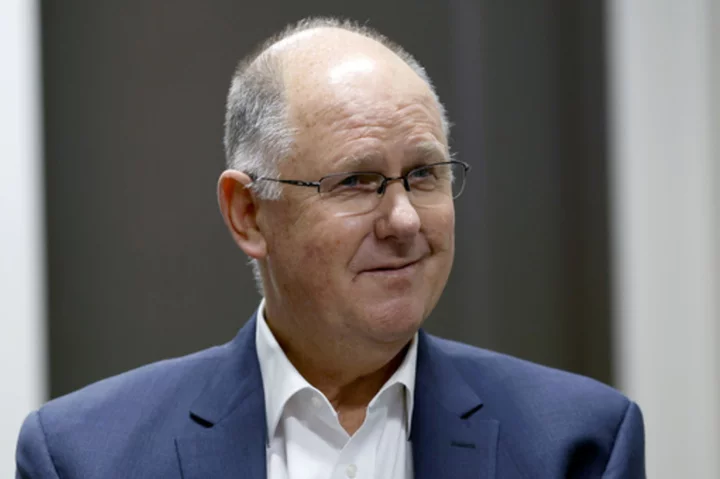
Saudi Arabia is being considered by the women's tennis tour for possible business
Women’s tennis is looking into the possibility of getting into business with Saudi Arabia
2023-07-01 03:17
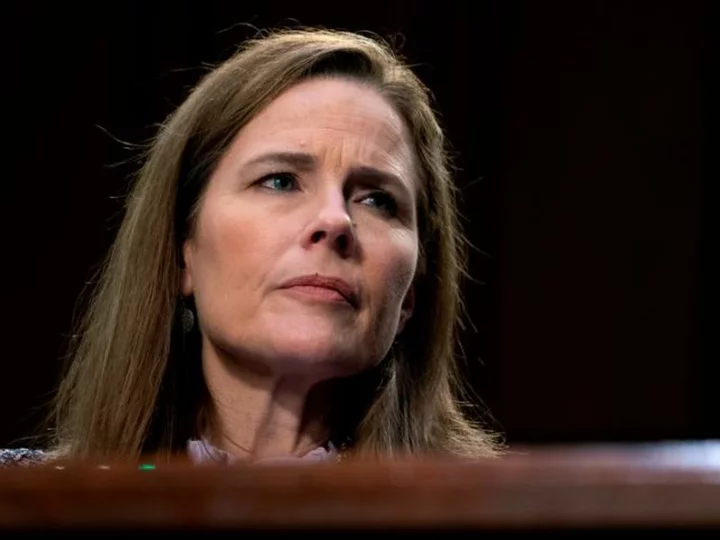
Why Justice Amy Coney Barrett wrote about babysitters in her student loan opinion
Justice Amy Coney Barrett, in a concurrence to Friday's ruling striking down President Joe Biden's student debt forgiveness plan, defended the Supreme Court conservative majority's use of a controversial legal theory and -- deploying analogies concerning babysitters and grocery store owners -- laid out how she believed the doctrine should be used in the future.
2023-07-01 03:16
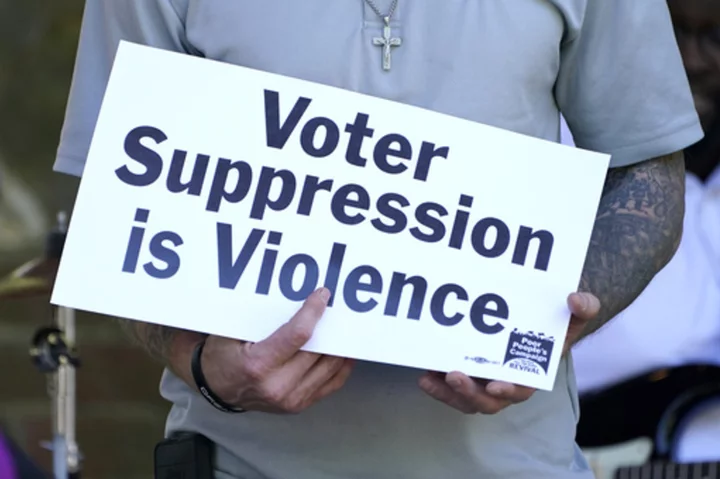
Supreme Court won't hear challenge to Jim Crow-era Mississippi bans blocking some felons from voting
The U.S. Supreme Court says it will not stop Mississippi from removing voting rights from people convicted of certain felonies — a practice that originated in the Jim Crow era with the intent of stopping Black men from influencing elections
2023-07-01 02:56
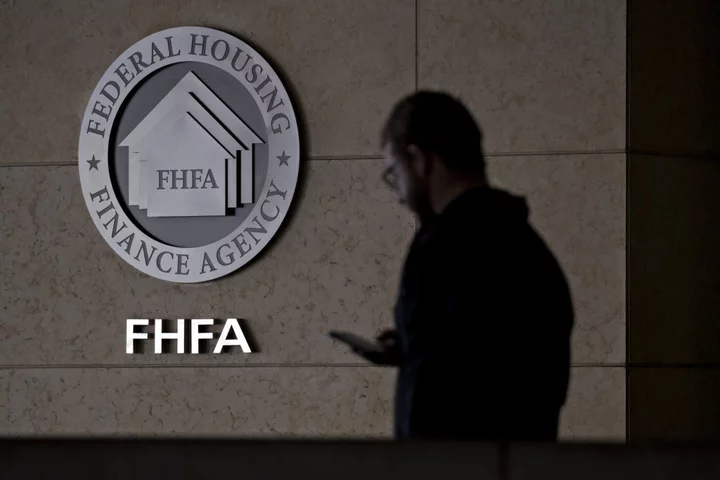
US Regulator Considers Limiting Big Banks’ Borrowing From Backstop Lender
US officials are considering limits on the ability of large lenders to use Federal Home Loan Banks as
2023-07-01 02:52
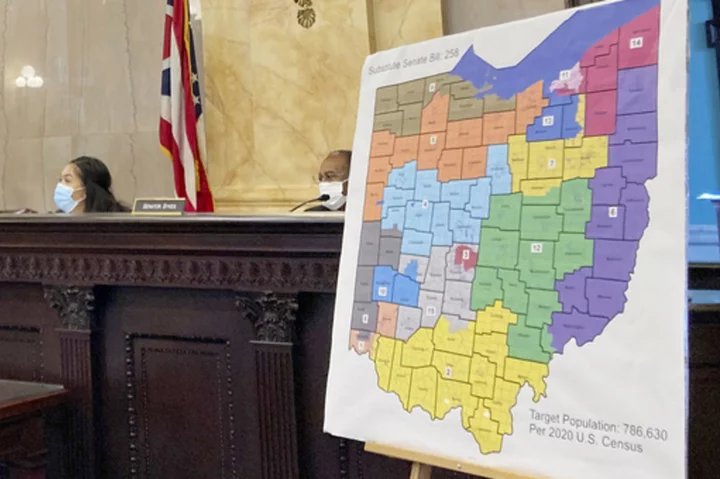
Supreme Court directs Ohio's top court to take another look at redistricting lawsuit
Ohio's top court has been ordered to take another look at the legality of the state's congressional districts
2023-07-01 02:46

US State Department report details damning failings around chaotic Afghanistan withdrawal
The US State Department on Friday released its long-awaited Afghanistan After Action Review report, which outlines damning findings and criticizes both the Trump and Biden administrations for decisions that led to the deadly and chaotic US withdrawal from that country after nearly two decades on the ground.
2023-07-01 02:45

Angry onlookers shout ‘dog killer’ at George Santos as he arrives at court for fraud hearing in New York
Angry protesters called congressman George Santos a “dog killer” on Friday as the Republican made an appearance at a Long Island federal court house, his first hearing since pleading not guilty last month to a13-count indictment related to fraud and money laundering charges. The chants were in reference to an alleged scandal in which the representative allegedly made off with more than $3,000 raised in a fundraiser to save a disabled US Navy veteran’s service dog, one of the many alleged acts of deception Mr Santos made as he worked towards his spot in Congress. The first-term congressman has denied knowing about veteran Richard Osthoff or his dog, calling the allegations “fake.” As Mr Santos exited court, Mr Osthoff, who was in the crowd, yelled, “You killed Sapphire, George. You killed my dog.” Others in the crowd reportedly chanted, “Resign” and “Shame” as the Republican passed by. Mr Santos was in court for a status conference on the federal case against him, where he faces 13 different charges, including fraud, money laundering, and theft of public funds. Prosecutors charge the New York rep mislead supporters and donors into giving him money, which he allegedly used for personal expenses that funded a lavish lifestyle. They also claim he misleadingly obtained unemployment benefits and lied about his personal finances when campaigning for the House of Representatives. Mr Santos has admitted to lying about certain aspects of his background, and is accused of fabricating everything from his education background to his religion to his career success. In court, Mr Santos did not speak, but his lawyers claim he and the government have exhibited a “wonderful working relationship” so far. The defence also said the prosecution has given them 86,000 pages of evidence to go through. The next court date for Mr Santos is 7 September. Outside of the federal case against him, Rep Santos is also under investigation by the House Ethics Committee. Read More Santos reveals names of two $500,000 bond cosigners ahead of court-ordered release Aide fired by George Santos says he got his job after sending money to Republican's deputy Effort to expel Santos falters as Republicans vote to send measure to Ethics Committee Watch: George Santos returns to court after fraud and money laundering charges AP News Digest 3:05 a.m. Rep. George Santos set to appear federal court on fraud and money laundering charges
2023-07-01 02:25

Affirmative action ruling could place target on US corporate diversity programs
By Daniel Wiessner The U.S. Supreme Court ruling striking down race-conscious policies in college admissions includes some warnings
2023-07-01 02:22
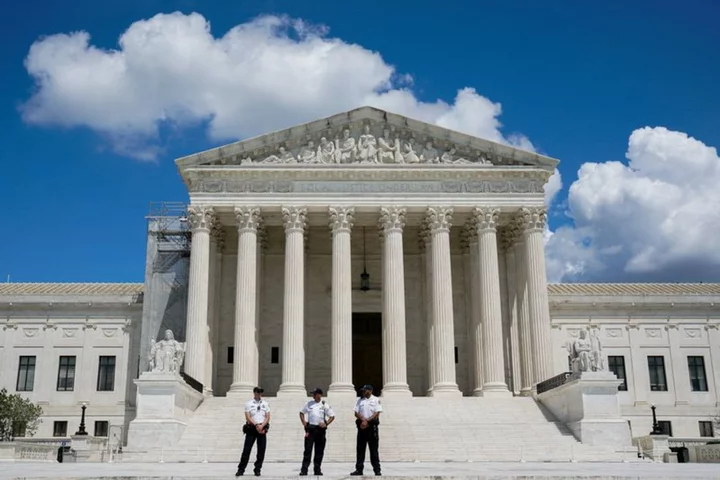
U.S. Supreme Court to consider scope of workplace bias law
By Daniel Wiessner The U.S. Supreme Court on Friday agreed to decide whether workers can bring discrimination lawsuits
2023-07-01 02:19
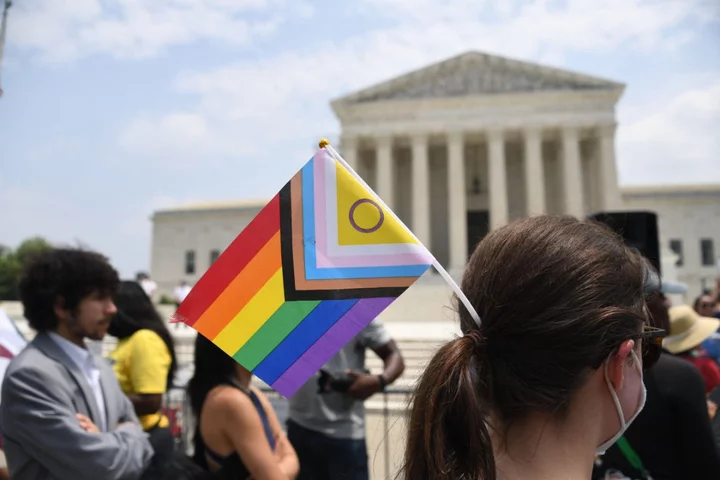
The ‘fake’ gay marriage case in the middle of the Supreme Court’s latest threat to LGBT+ rights
A Christian website designer in Colorado did not want to provide her services to same-sex couples, potentially running afoul of state law that prohibits public-facing businesses from discriminating against LGBT+ people. The designer didn’t have any same-sex clients. She didn’t receive any requests from gay couples to work on their wedding websites. But in her legal challenge, supported by an influential right-wing legal group that backed a lawsuit ending Roe v Wade, she argued that Colorado’s law infringed on her First Amendment rights. In its final day of its current term, the US Supreme Court’s conservative supermajority agreed, potentially endangering already vulnerable rights of LGBT+ Americans and state governments’ abilities to protect them. But a crucial piece of evidence in the case appears to have been fabricated. A man who is named throughout the case, and whose phone number and email address were attached in court filings, claims he has nothing to do with it. In 2016, Lorie Smith claimed in filings that a man named “Stewart” contacted her website to help with his upcoming wedding to a person named “Mike”: “We are getting married early next year and would love some design work done for our invites, placenames etc. We might also stretch to a website.” The New Republic found “Stewart”. He said he is straight, married to a woman, and never contacted Ms Smith. His alleged request for services came within 24 hours after Ms Smith first filed her lawsuit in state court. “If somebody’s pulled my information, as some kind of supporting information or documentation, somebody’s falsified that,” he explained to The New Republic. “I’m married, I have a child – I’m not really sure where that came from? But somebody’s using false information in a Supreme Court filing document.” It remains unclear, even after the Supreme Court’s decision, how and why he is involved. In a statement to The Independent, attorneys for Ms Smith dismissed his reaction and claimed that the service request was genuine. A spokesperson for Colorado’s attorney general pointed to earlier claims that there was no proof that it was. Meanwhile, the statements “Stewart” claims to never have made, and arguments from attorneys who use his name and alleged statements, remain printed across several court documents. In a motion filed by attorneys for Colorado in 2016 to dismiss the case, they pointed out that Ms Smith had never received any request for services and had no standing to sue. A response from the Alliance Defending Freedom, the conservative Christian group representing Ms Smith, asserted that it was not necessary to have received any such inquiry before challenging state law. Months later, in February 2017, in an effort to bolster their challenge to state law, attorneys for the group said that Ms Smith received an inquiry, weeks before Colorado attorneys asked to dismiss the case. “Notably, any claim that Lorie will never receive a request to create a custom website celebrating a same-sex ceremony is no longer legitimate because Lorie has received such a request,” according to the filing. Later that year, following a court ruling in Colorado’s favour, the group mentioned “Stewart” and “Mike” in a press release. In a December 2021 filing with the Supreme Court, attorneys for Colorado responded to the alleged request again, noting that the inquiry “was not a request for a website at all, but just a response to an online form asking about ‘invites’ and ‘place-names,’ with a statement that the person ‘might also stretch to a website.’” The Alliance Defending Freedom fired back in a reply brief, once again mentioning a request that may not even exist: “Colorado’s claim – that a request from ‘Mike’ and ‘Stewart’ for a wedding website does not reflect a same-sex wedding request – blinks reality.” The Independent asked representatives for the Alliance Defending Freedom how “Stewart” became involved with the case. Senior counsel Kellie Fiedorek said The New Republic’s findings are a “last-minute attempt to malign Lorie [that] smacks of desperation to delegitimize her civil rights case and our judicial system.” “It’s undisputed that Lorie received this request through her website. She doesn’t do background checks on incoming requests to determine if the person submitting it is genuine,” she added. “Whether Lorie received a legitimate request or whether someone lied to her is irrelevant. No one should have to wait to be punished by the government to challenge an unjust law.” A spokesperson for the office of Colorado’s attorney general did not have a comment prior to the ruling but pointed The Independent to its brief with the Supreme Court noting that Ms Smith did not take “any steps to verify that a genuine prospective customer submitted the form.” The Supreme Court’s decision is a blow to LGBT+ advocates who fear the case could open the door for rollbacks to discrimination protections, with Justice Sonia Sotomayor noting that the ruling comes in the middle of a wave of state laws targeting LGBT+ people. “This case cannot be understood outside of the context in which it arises,” she wrote in her dissent. “In that context, the outcome is even more distressing. … In this pivotal moment, the Court had an opportunity to reaffirm its commitment to equality on behalf of all members of society, including LGBT people. It does not do so.” A statement from Kelley Robinson, president of the Human Rights Campaign, the nation’s largest LGBT+ civil rights organization, said the court’s decision “is a dangerous step backward, giving some businesses the power to discriminate against people simply because of who we are.” President Joe Biden, noting the decision’s arrival on the final day of Pride Month, said he is “deeply concerned that the decision could invite more discrimination” against LGBT+ Americans. “More broadly, today’s decision weakens long-standing laws that protect all Americans against discrimination in public accommodations – including people of color, people with disabilities, people of faith, and women,” he added. Read More Supreme Court allows Colorado designer to deny LGBT+ customers in ruling on last day of Pride Month The Supreme Court just made me a second-class citizen ‘It’s hard on our family’: For these lawmakers with trans children, Republican attacks are personal
2023-07-01 02:19

Brazil's Jair Bolsonaro barred from running for office for 8 years
Brazil's highest electoral court formed a majority to ban former President of Brazil Jair Bolsonaro from running for office until 2030 on Friday on charges alleging that he abused his political power and misused of public resources.
2023-07-01 02:15
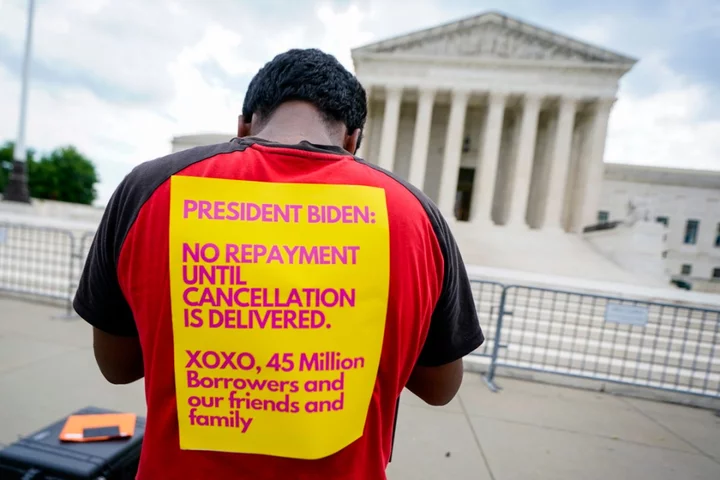
Supreme Court strikes down Biden’s plan to cancel student loan debts
The US Supreme Court has struck down President Joe Biden’s plan to cancel student loan debts for millions of Americans, reversing his campaign-trail promise as borrowers prepare to resume payments this summer. Chief Justice John Roberts delivered the 6-3 decision from the court’s conservative majority on 30 June. The ruling, which stems from a pair of cases challenging the Biden administration and the US Department of Education, argues that the president does not have the authority to implement sweeping relief, and that Congress never authorised the administration to do so. Within 30 minutes on the last day of its term, the court upended protections for LGBT+ people and blocked the president from a long-held promise to cancel student loan balances amid a ballooning debt crisis impacting millions of Americans. Under the plan unveiled last year, millions of people who took out federally backed student loans would be eligible for up to $20,000 in relief. Borrowers earning up to $125,000, or $250,000 for married couples, would be eligible for up to $10,000 of their federal student loans to be wiped out. Those borrowers would be eligible to receive up to $20,000 in relief if they received Pell grants. Roughly 43 million federal student loan borrowers would be eligible for that relief, including 20 million people who stand to have their debts canceled completely, according to the White House. Roughly 16 million already submitted their applications and received approval for debt cancellation last year, according to the Biden administration. The long-anticipated plan for debt cancellation was met almost immediately with litigation threats from conservative legal groups and Republican officials, arguing that the executive branch does not have authority to broadly cancel such debt. Six GOP-led states sued the Biden administration to stop the plan altogether, and a federal appeals court temporarily blocked any such relief as the legal challenges played out. Lawyers for the Biden administration contended that he has the authority to broadly cancel student loan debt under the Higher Education Relief Opportunities for Students Act of 2003, which allows the secretary of education to waive or modify loan provisions following a national emergency – in this case, Covid-19. Justice Roberts wrote that the law allows the secretary to “waive or modify” existing provisions for financial assistance, “not to rewrite that statute from the ground up.” The Supreme Court’s final decision of its 2022-2023 term also comes one day after another major education ruling, as the same conservative majority upended decades of precedent intended to promote racially diverse college campuses, what civil rights groups and the court’s liberal justices have derided as the court’s perversion of the 14th Amendment and the foundational concept of equal protection. Moments before its decision in the student debt plan, the Supreme Court decided a case involving a website designer who refused to cater to same-sex couples, but the case did not involve any such couple. Likewise, the case at the centre of the court’s decision on student loans involved an independent loan servicer in Missouri that did not want to be associated with the lawsuit. The six GOP-led states that led the challenge – Arkansas, Iowa, Kansas, Missouri, Nebraska, and South Carolina – opposed the Biden administration’s plan for a range of reasons that amount to “just general grievances; they do not show the particularized injury needed to bring suit,” Justice Elena Kagan wrote in her dissent. “And the States have no straightforward way of making that showing – of explaining how they are harmed by a plan that reduces individual borrowers’ federal student-loan debt,” she added. “So the States have thrown no fewer than four different theories of injury against the wall, hoping that a court anxious to get to the merits will say that one of them sticks.” She admonished a decision in which “the result here is that the Court substitutes itself for Congress and the Executive Branch in making national policy about student-loan forgiveness.” “The Court acts as though it is an arbiter of political and policy disputes, rather than of cases and controversies,” and by deciding the case, the court exceeds “the permissible boundaries of the judicial role,” Justice Kagan wrote. Since March 2020, with congressional passage of the Cares Act, monthly payments on student loan debt have been frozen with interest rates set at zero per cent. That Covid-19-pandemic era moratorium, first enacted under Donald Trump and extended several times, was paused a final time late last year – until the Education Department is allowed to cancel debts under the Biden plan, or until the litigation is resolved, but no later than 30 June. Payments would then resume 60 days later. The amount of debt taken out to support student loans for higher education costs has surged within the last decade, alongside growing tuition costs, increased private university enrollment, stagnant wages and GOP-led governments stripping investments in higher education and aid, putting the burden of college costs largely on students and their families. The crisis has exploded to a total balance of nearly $2 trillion, mostly wrapped up in federal loans. Millions of Americans also continue to tackle accrued interest without being able to chip away at their principal balances, even years after graduating, or have been forced to leave their colleges or universities without obtaining a degree at all while still facing loan repayments. Borrowers also have been trapped by predatory lending schemes with for-profit institutions and sky-high interest rates that have made it impossible for many borrowers to make any progress toward paying off their debt, with interest adding to balances that exceed the original loan. One analysis from the Education Department found that nearly 90 per cent of student loan relief would support people earning less than $75,000 per year. The median income of households with student loan balances is $76,400, while 7 per cent of borrowers are below the poverty line. That debt burden also falls disproportionately on Black borrowers and women. Black college graduates have an average of $52,000 in student loan debt and owe an average of $25,000 more than white graduates, according to the Education Data Initiative. Four years after graduating, Black student loan borrowers owe an average of 188 per cent more than white graduates. Women borrowers hold roughly two-thirds of all student loan debt, according to the American Association of University Women. Mr Biden’s announcement fulfilled a campaign-trail pledge to wipe out $10,000 in student loan debt per borrower if elected, though debt relief advocates and progressive lawmakers have urged him to cancel all debts and reject means-testing barriers in broad relief measures. In November 2020, the president called on Congress to “immediately” provide some relief for millions of borrowers saddled by growing debt. “[Student debt is] holding people up,” he said at the time. “They’re in real trouble. They’re having to make choices between paying their student loan and paying the rent.” ReNika Moore, director of the Racial Justice Program with the ACLU, among civil rights groups that filed briefs with the Supreme Court to defend the loan cancellation plan, said the “one-two punch” to end affirmative action and block debt relief will lock Americans out of economic oppurtunity and worsen wealth equality. “We urge the Biden administration and the Department of Education to move quickly to explore other pathways to ease the debt load on student loan borrowers once payments resume after a pandemic-related pause, including new executive action under the Higher Education Act, a law that allows for student loan relief for certain groups,” she added. Read More Supreme Court allows Colorado designer to deny LGBT+ customers in ruling on last day of Pride Month Biden condemns Supreme Court striking down affirmative action: ‘This is not a normal court’ Justice Ketanji Brown Jackson delivers searing civil rights lesson in dissent to affirmative action ruling The Supreme Court’s ruling on affirmative action is ugly and frustrating – but no surprise
2023-07-01 01:57
